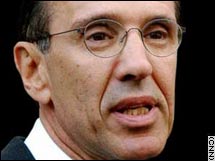|
ImClone's next headache The biotech appears likely to lose a patent trial involving Erbitux, its lucrative cancer drug and sole product.
(FORTUNE Magazine) -- Imclone, the biotech best known for a stock collapse that helped land founder Sam Waksal and his pal Martha Stewart in the slammer, could use a dose of good news. On Aug. 10, ImClone (Charts) gave up its seven-month attempt to sell itself and saw its swooning shares tumble further after the announcement. And less than two weeks later it agreed to offer board seats to corporate cage rattler Carl Icahn and three allies, who declared that it would be a "major error" to retain interim CEO Joseph Fischer.
At least one more headache looms: ImClone appears likely to lose a patent trial involving Erbitux, its lucrative cancer drug and sole product. The judge's verdict could come at any time. The patent in question protects the method of combining monoclonal antibodies such as Erbitux with traditional chemotherapy drugs. A review of some 1,100 pages of testimony and court filings suggests that - although anything can happen - ImClone will lose at least part, and possibly all, of its control of the patent. The trial is the culmination of a strange 20-year saga. It pits three distinguished scientists from Israel's Weizmann Institute against ex-colleague Joseph Schlessinger, who testified that he'd been nominated for a Nobel Prize. The scientists accuse Schlessinger of absconding with their idea of combining a monoclonal antibody with chemotherapy, taking it to a corporate predecessor of Sanofi-Aventis (Charts), and secretly applying for a patent on it. While the application was pending, Aventis licensed the rights exclusively to ImClone. (Schlessinger denied impropriety and claimed credit for the antibody and the combination.) ImClone had reason to question who the inventor was as early as 1994, when the U.S. Patent Office rejected its application on the grounds that the Weizmann scientists had published an article describing the combination idea before Aventis filed for the patent. ImClone told the patent office it would provide support for its claim, then dropped the application. The company later refiled, and the patent office relented. Before and during trial, the judge expressed skepticism about ImClone's case. At one point the scientists' lawyer, Nicholas Groombridge of Weil Gotshal & Manges, protested that they couldn't be expected to discover the patent because ImClone had hidden it from them. A defense lawyer interjected: "Objection. That's just argument, your honor." Responded the judge: "It's a good argument, though." And in one ruling the judge noted that "defendants have produced no documentation verifying their claim...." How critical is this patent? An ImClone executive testified that "had we not had the patent, we would not have made this kind of investment" in developing Erbitux. ImClone spokesman David Pitts argues that "losing this patent doesn't prevent us from continuing to sell Erbitux" - it will simply make it more costly for ImClone. That would still be bad news. Citigroup analyst Yaron Werber (who titled a recent report "IMCL Likely to Lose Case") thinks ImClone's royalty rates would increase one to three percentage points and shave as much as 20% off its earnings. Analysts also say that losing the patent may make it harder for ImClone to block certain uses of a potential competing drug from Amgen (Charts). Not for the first time at ImClone, tumult is obscuring good news: Erbitux sales rose 76% last quarter (vs. the same quarter in 2005) after the drug was approved to treat head and neck cancer. And the company will probably seek the FDA's blessing to expand into the pancreatic and lung cancer markets. Yet ImClone can't seem to shake the demons of its past. |
|

